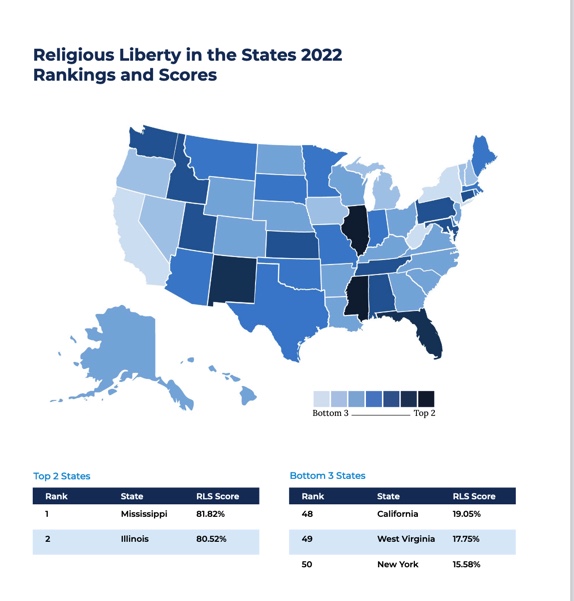WASHINGTON — In a ranking of how the 50 states protect religious liberties, New York came in last, and Mississippi came in first.
The state rankings are part of the “Religious Liberty in the States Report,” issued by The Center for Religion, Culture and Democracy — an initiative of the First Liberty Institute, a nonprofit public interest law firm based in Texas.
The group issued its first report in the fall but hopes to continue this deep dive annually.
The report’s executive summary describes religious liberty as “an experience that extends beyond the physical walls and the operations of the nation’s houses of worship.” It also cautions that the exercise of religion requires “deliberate and nimble safeguarding,” particularly when the divergent views of Americans can be “arbitrated by government entities.”
The report based its state ranking on the number of religious liberty safeguards in each state, such as absentee voting to allow religious people to participate in elections on religious holidays, exemptions from childhood immunization requirements, and the existence of a Religious Freedom Restoration Act.
The rankings also indicated the ability of health care providers within the state to refuse to provide services that go against their religious beliefs, such as abortions, sterilizations, and contraception.
This report did not focus on other hot-button topics with religious liberty, such as state-funded scholarships for religious schools, adoption, and foster care, employment discrimination, and the treatment of prisoners. In some cases, those issues involved federal laws, so the report could not make a state-by-state comparison, but the report also indicated that these issues might be included in a future study.
For the state ranking, states scored points for the percentage of safeguards they had in place to protect religious liberty. Mississippi contained 82% of these safeguards, while New York only had 16% of them.
Mississippi did not have absentee voting or religious exemptions for vaccination requirements. New York only had two of the 11 safeguards used by the report: protections for religious health care workers who do not want to perform abortions and protections for religious officials who do not want to perform same-sex marriages.
New York lost points for not granting state doctors legal protections for refusing to perform sterilizations or prescribe contraception.
West Virginia and California ranked just above New York in the report, and Illinois ranked second after Mississippi.
An overview of the findings shows that 45 states had the religious exemption to childhood vaccination requirements, and 40 states allow absentee voting for religious reasons. Thirty-three states have religious exemptions to the health insurance mandate requiring employers to cover their employees’ contraceptives in health care plans.
Mississippi had the most exemptions in place for religious officials, public officials, and businesses that do not want to participate in same-sex weddings, while 30 states did not have any protection for those objecting to participating in same-sex weddings for religious reasons.
U.S. Catholic bishops have also been keeping tabs on religious liberty issues on the federal and state levels.
The Committee for Religious Liberty at the U.S. Conference of Catholic Bishops lists current threats to religious liberty on its website and points out that “although Americans generally do not face the kind of violent persecution endured by many people of faith around the world,” many face what Pope Francis has described as a form of “polite persecution.”
At the top of the committee’s list is the mandate by the U.S. Department of Health and Human Services requiring employers to cover contraceptive and abortion-inducing drugs in their employee health insurance, even if the employer objects on moral grounds.
The committee also listed foster care programs that have been revoked for their refusal to place children with same-sex couples and state laws that forbid “harboring” undocumented immigrants. It also noted discrimination against small church congregations when policies prevent church groups from renting public schools on weekends for church services.
The report by the Center for Religion, Culture and Democracy pointed out in its summary that recent changes in laws “including anti-discrimination laws in employment and public accommodations, health insurance mandates, and others — have triggered more complicated and heated competing liberty claims.”
It said that even though religious people are “generally not the intended focus of these laws, those who believe that their religious living and practice extend beyond worship, narrowly defined, may nonetheless encounter obstacles to their religious liberty.”

